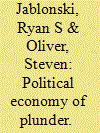| Srl | Item |
| 1 |
ID:
080892


|
|
|
|
|
| Publication |
2008.
|
| Summary/Abstract |
International norms change over time, but we do not fully understand how and why they evolve as they do. In this article, I explore a general model of international norm change. The model builds on two foundations. First, normative systems themselves generate tensions that lead to change. Those tensions are of two major types: (1) conflicts between the generality of rules and the specificity of concrete experience; and (2) conflicts between separate bodies of rules. Second, specific disputes push these normative conflicts to the fore and provoke arguments about the meaning and application of rules. The outcomes of those arguments necessarily modify the rules. The process of normative change is thus a cycle, linking rules to actions to arguments, which in turn reshape the rules. In order to explore the empirical utility of the model, the article assesses the evolution of the rules of war with respect to the plundering of artistic and cultural treasures. Relying on both secondary and archival materials, the analysis focuses on two crucial turns through the cycle of normative change, the Napoleonic Wars and World War II. The empirical account shows that the cycle of normative change depicted in the abstract does correspond to real-world processes.
|
|
|
|
|
|
|
|
|
|
|
|
|
|
|
|
| 2 |
ID:
172225


|
|
|
|
|
| Summary/Abstract |
This article traces the fortunes of one of India’s great libraries, which Tipu Sultan of Mysore amassed largely through plunder and which the British East India Company plundered in turn. It shows how Tipu used the library to legitimise his authority and how rival factions of the Company, after defeating him in 1799, did the same. The article links the figuration of loot in the subcontinent, as studied by historians of material culture, to the conceptualisation of British India, as studied by historians of political thought. More broadly, it attests the symbolic power that plunder had—perhaps still has—to confer prestige.
|
|
|
|
|
|
|
|
|
|
|
|
|
|
|
|
| 3 |
ID:
121849


|
|
|
|
|
| Publication |
2013.
|
| Summary/Abstract |
Maritime piracy is a growing scourge on the international community-imposing large costs on maritime states and the shipping industry, as well as potentially undermining state capacity and funding terrorism. Using original data on over 3,000 pirate attacks, the authors argue that these attacks are, in part, a response to poor labor market opportunities. To establish this, the authors take advantage of the strong effect of commodity prices on labor market opportunities in piracy-prone states. Consistent with this theory, the authors show that changes in the price of labor- and capital-intensive commodities have consistent and strong effects on the number of pirate attacks in a country's territorial waters each month. The authors confirm these results by instrumenting for commodity prices using monthly precipitation levels.
|
|
|
|
|
|
|
|
|
|
|
|
|
|
|
|